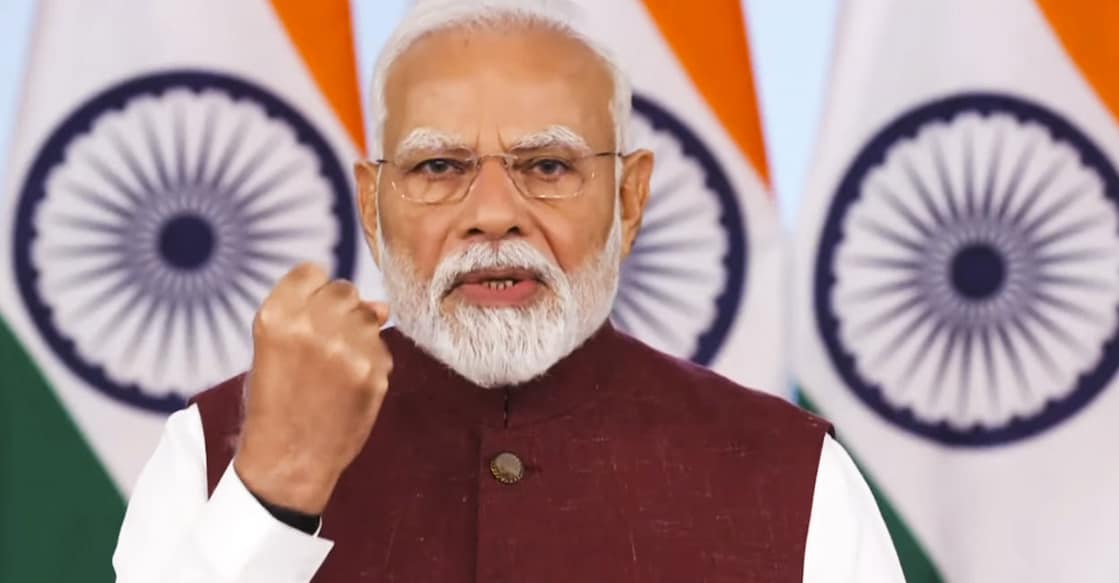No talks or trade amid terror; won't tolerate nuclear blackmail: PM Modi warns Pakistan

Mail This Article
New Delhi: Prime Minister Narendra Modi on Monday reaffirmed India’s firm stance against terrorism, stating that the country would no longer differentiate between terrorists and their state sponsors. In his address to the nation, Modi emphasised that India would not tolerate any form of nuclear blackmail, underlining that Operation Sindoor represents the country’s new policy against terrorism.
The Prime Minister also pointed out that while operations against Pakistan have been temporarily halted, the future of such actions would depend on the neighbouring country's behaviour.
Highlighting the success of Operation Sindoor, Modi said that after suffering significant setbacks, Pakistan reached out in desperation. "Pakistan pleaded with us to stop attacks, but we only considered it after they promised to cease their misadventures," he said.
The Prime Minister paid tribute to the bravery of the Indian armed forces, dedicating their actions to the mothers, sisters, and daughters of the country. He applauded the courage and resolve of the forces, stating, "I dedicate this bravery of the armed forces to the mothers, sisters, and daughters of this country."
Modi also described the Pahalgam terror attack as one of the most "barbaric" acts of terrorism, expressing personal pain over the tragic loss. "The Pahalgam attack was the most barbaric face of terrorism; it was a personal pain for me," Modi said.

Addressing the success of Operation Sindoor, he said that the Indian armed forces were given complete freedom to act, ensuring that terrorists were "ground into dust."
The Prime Minister also reflected on the symbolic significance of the operation, saying, "The enemy has now realised the consequences of removing 'sindoor' from the forehead of our women; Operation Sindoor was not just a name."
While concluding his speech, Modi asserted that “terror and talks cannot happen at the same time, terror and trade cannot go hand in hand, and water and blood will not flow together.”
The address comes two days after India and Pakistan reached an understanding to immediately halt all firing and military action across land, air, and sea.
Earlier on Monday, senior military commanders detailed how India thwarted attempted Pakistani strikes and maintained a firm defensive posture while targeting Pakistani military infrastructure. The briefing was held ahead of a scheduled hotline conversation between the Directors General of Military Operations (DGMOs) of both countries, initially planned for noon but later postponed to the evening.
“Our fight is with terrorists, not the Pakistan military. But it is unfortunate that the Pakistan military has chosen to make this fight their own,” said Air Marshal AK Bharti, highlighting India’s integrated and multi-layered air defence capabilities. He noted that systems like the long-range surface-to-air defences and the indigenous Akash missile system had performed exceptionally during recent engagements.
“All our military bases and systems remain fully operational and ready to undertake any mission,” Bharti added, confirming that repeated Pakistani attempts to breach Indian defences had been neutralised.
Operation Sindoor was launched on the night of May 6–7 in retaliation for the Pahalgam terror attack, which claimed 26 lives. The Indian armed forces targeted nine terror camps in Pakistan and Pakistan-occupied Kashmir, killing over 100 terrorists. In response, Pakistan attempted attacks on several Indian military bases on May 8, 9, and 10.
India launched a fierce counter-offensive against multiple Pakistani military installations, including Rafiqui, Murid, Chaklala, Rahim Yar Khan, Sukkur, and Chunian. Radar sites at Pasrur and the Sialkot aviation base were also hit with precision munitions, causing significant damage.
Director General of Military Operations Lt Gen Rajiv Ghai said that 35–40 Pakistani military personnel were killed in the combat and that India had successfully met its strategic objectives.

